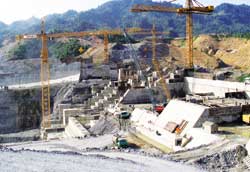EVN pleads poor as power crisis worsens
Electricity shortages are becoming more serious as Electricity of Vietnam faces a lack of investment capital delaying many power projects.
 |
Under master plan VI, the government appointed EVN as the investor of those projects, which are expected to notably contribute to easing the shortage of electricity in the country. “We cannot arrange investment capital for those projects. As we all know, local banks are tightening their credit growth and I think they do not have enough money for lending too,” said Huynh Van Thanh, the chief of EVN’s Planning Department.
He said the best way to boost electricity project development was to call for domestic and foreign investment.
However, Deputy Minister of Planning and Investment Cao Viet Sinh said EVN’s low electricity prices were not attractive to investors.
“This is a serious issue that we have to deal with. If those power projects fail to meet the deadline, Vietnam’s economic development will be severely impacted in upcoming years,” Sinh said. Electricity shortages have become a big issue in the country, negatively impacting on domestic and foreign enterprise production schedules. The business community said electricity plant development had not kept pace with rapid investment inflows.
To develop power plants, the government drew up master plan VI, a development plan from 2006 to 2015 and appointed EVN to invest in 25 power plants. “We are afraid that we do not have the ability to invest in all of these projects at this time,” said Thanh. EVN planned to invest about $2.5 billion in power projects in 2008, but the group has only earmarked $2 billion for development so far.
In July, Deputy Prime Minister Hoang Trung Hai asked EVN to stop investing outside its core business and focus on developing electricity plants. He also required local banks and relevant ministries such as the Ministry of Finance and State Bank to ensure capital for power projects. Previously, some local banks delayed implementing credit contracts signed with EVN due to difficulties mobilising funds. However, Thanh said that local banks had arranged only 60 per cent of total capital, for which EVN had signed contracts.
Pham Le Thanh, general director of EVN, said that some local banks had recently asked for discussions on the credit contracts signed with EVN and some foreign banks had refused to lend to EVN. Huynh Van Thanh said that the group had listed nine projects, which would be prioritised this year. “It is still very hard to implement the plan,” he said. Only three of nine projects including Mong Duong thermoelectric plant 2, Nghi Son thermoelectric plant and Thai Binh power plant have arranged investment capital.
He said local bank borrowing difficulties not only affected new projects, but also other construction deadlines.
“All of the construction projects will fail to meet the deadline. We see that many contractors have stopped work at power projects because of the ramping prices of materials and the high lending interest rates of local banks,” Thanh said.
He said increased construction material and equipment prices were a hindrance to power plant development. Other investors, who planned to join hands with EVN for power project development have also reconsidered their plans.
Thanh revealed that Vietnam National Coal and Mineral Industries Group (Vinacomin) and Vinaconex Corporation had withdrawn their capital from Quang Ninh thermoelectric project.
Vinacomin reduced its capital from 15 per cent to 8 per cent in the project while Vinaconexwould not take part in the joint venture anymore, said Thanh.
What the stars mean:
★ Poor ★ ★ Promising ★★★ Good ★★★★ Very good ★★★★★ Exceptional
 Tag:
Tag:
Related Contents
Latest News
More News
- Hermes joins Long Thanh cargo terminal development (February 04, 2026 | 15:59)
- SCG enhances production and distribution in Vietnam (February 04, 2026 | 08:00)
- UNIVACCO strengthens Asia expansion with Vietnam facility (February 03, 2026 | 08:00)
- Cai Mep Ha Port project wins approval with $1.95bn investment (February 02, 2026 | 16:17)
- Repositioning Vietnam in Asia’s manufacturing race (February 02, 2026 | 16:00)
- Manufacturing growth remains solid in early 2026 (February 02, 2026 | 15:28)
- Navigating venture capital trends across the continent (February 02, 2026 | 14:00)
- Motivations to achieve high growth (February 02, 2026 | 11:00)
- Capacity and regulations among British areas of expertise in IFCs (February 02, 2026 | 09:09)
- Transition underway in German investment across Vietnam (February 02, 2026 | 08:00)






















 Mobile Version
Mobile Version